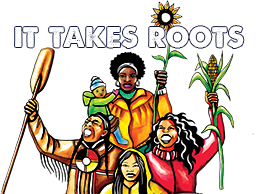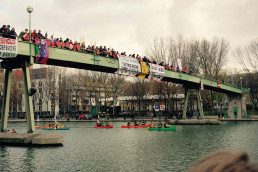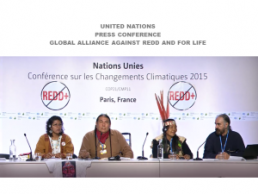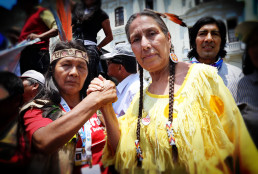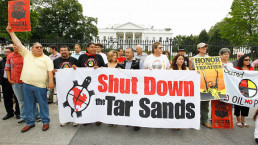Historic Kayak Action Demands Indigenous Peoples' Rights in Paris Climate Accord
For Immediate Release:
December 7th, 2015
Contact: Dallas Goldtooth, Indigenous Environmental Network, France: +33 75 1413 823, US: + 708 515-6158, [email protected]
 Paris – An all-Indigenous flotilla of kayaks took to the waters of Paris today, followed by a press conference featuring Indigenous leaders from the Americas delivering strong messages: warnings of the worst consequences of climate change, and holistic solutions to protect Mother Earth. This event, proposed by the Kichwa community of the Sarayaku, served as a platform to reject false climate solutions, and to deliver three key documents designed as a means to address climate change.
Paris – An all-Indigenous flotilla of kayaks took to the waters of Paris today, followed by a press conference featuring Indigenous leaders from the Americas delivering strong messages: warnings of the worst consequences of climate change, and holistic solutions to protect Mother Earth. This event, proposed by the Kichwa community of the Sarayaku, served as a platform to reject false climate solutions, and to deliver three key documents designed as a means to address climate change.
The flotilla action this afternoon was made all the more poignant and necessary, following the first week of negotiations at COP21, where – despite vocal objections and protestations by Indigenous Peoples and their allies – the operative text of the Paris Accord has had the language concerning the rights of Indigenous Peoples “annexed” (meaning it’s not totally in the draft agreement, nor is it being fully excluded), rendering it’s future inclusion questionable.
“Considering that Indigenous communities often face the worst consequences of climate change, the decision to reject Indigenous Rights and advocate for false solutions is not only offensive and intolerable, but illogical and destructive to the climate change movement as a whole.” – Dallas Goldtooth, Keep Fossil Fuels in the Ground Campaign Organizer. “Carbon trading and REDD+ projects are schemes to continue business-as-usual, nothing more. We, as frontline Indigenous communities, are the arbiters and innovators of real solutions towards mitigating climate change.”
Indigenous Peoples from the Amazon to the Arctic and their allies have and will continue to gather to demand real climate solutions, including bottom-up initiatives originating in Indigenous knowledge, culture, and spirituality.
“We’re here to present our proposal of kawsak-sacha: the living rainforest, the living Amazon. This proposal respects all living beings and helps achieve a balance of our planet, our Mother Earth. Indigenous peoples live with this wisdom – live in harmony with these living beings, and we’re here to protect the lagoons and the water, the trees and the mountains. We ARE the balance, we LIVE the balance and this is our contribution here in Paris.” Felix Santi, Sarayaku
“Only if our proposal is heeded will we be able to ensure the future, ensure the planet for future generations – so we present this proposal to the governments of the world and we declare indigenous peoples’ territories of vital and crucial importance to the future of our planet. There must be no more oil drilling, no more mining, no more logging on our lands and territories, and we must embrace this indigenous proposal of the living forest”.
For the second week of negotiati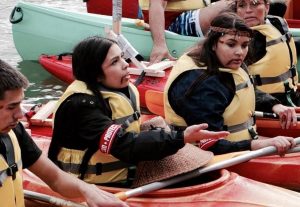 ons in Paris, Indigenous delegates are calling on their allies to push the parties involved in direct negotiations to reverse this damaging decision, thereby taking the climate change movement forwards, not backwards.
ons in Paris, Indigenous delegates are calling on their allies to push the parties involved in direct negotiations to reverse this damaging decision, thereby taking the climate change movement forwards, not backwards.
“The ground we walk on is literally melting beneath us. Indigenous peoples of the world are being affected by this climate chaos first, and our issues are compounded by the assault on our traditional territories by the fossil fuel extractive industries.” – Faith Gemmill, executive director REDOIL. “We kicked Shell out of the Arctic but immediately following that, the state and our congressional representatives called for drilling in the last 5% of America’s only Arctic coast: the Arctic National Wildlife Refuge, which is sacred to my people. This is our home, these are our sacred places, and it is our belief that the destruction of humanity begins if/when the oil companies gain access to these sacred places. We’re here to call upon the governments of the world to recognise the rights of Indigenous Peoples within the operative, legally binding text. No more business as usual – we don’t have the luxury of time. Humanity’s survival is on the line. We need a just transition to sustainable energy, economies and communities.”
IEN Advisory: Indigenous Rights on Chopping Block of UN COP21 Paris Climate Accord
December 4th, 2015
Press Contacts:
North America Dallas Goldtooth, Indigenous Environmental Network, [email protected],1-708-515-6158
EU Suzanne Dhaliwal, Indigenous Environmental Network, UK Tar Sands Network
[email protected] +447772694327
Paris - Saturday - December 5th - On Friday December 4th, Indigenous Peoples from around the globe demonstrated inside the UN Framework Convention on Climate Change (UNFCCC/COP21) convention centre at Le Bourget. The protest was carried out to highlight objections to the proposed removal of language pertaining to both the rights of Indigenous Peoples and Human Rights from Article 2.2 of the draft Paris Accord, ending the first week of negotiations.
Despite such vocal objections from Indigenous Peoples and their allies, the operative text of the Paris Accord, as it stands today, has had the rights of Indigenous Peoples language/clauses removed, and there is now a proposal to have ‘Human Rights’ removed as well. At present, this leaves the rights of Indigenous Peoples only reflected within the preamble - which is purely aspirational text, and not legally binding or enforceable in any way.
“The inclusion of the rights of Indigenous Peoples text, in addition to Human Rights text is crucial. A Western, non-Indigenous evaluation of Human Rights does not necessarily adequately protect our rights as Indigenous Peoples,” states Princess Daazhraii Johnson, REDOIL Alaska spokesperson.
“Many of our Indigenous peoples still live off the land, living a subsistence-based lifestyle. And given that many of the world’s fossil fuel reserves are on or adjacent to Indigenous lands, we must protect our collective rights to self-determine our relationship to Mother Earth by rejecting false solutions to addressing climate change,” concluded Ms. Johnson.
In addition, many countries do not recognize the collective rights of Indigenous Peoples as Human Rights. The Western international human rights system is oriented towardsindividual rights, and so a general reference to human rights does not adequately protect the collective rights of Indigenous Peoples.
“At the moment the rights of Indigenous Peoples all over the globe are being violated by ‘green climate projects’ - such as hydropower dams - in the name of ‘climate mitigation’. If such violations are happening now, imagine what will come with a legally binding document, where the rights of Indigenous Peoples are not guaranteed,” stated Eriel Deranger, member of the Athabasca Chipewyan First Nation.
Positions against both the exclusion of Human Rights and Indigenous Rights in the operative text are said to be based on concerns about potential legal liability, if climate change is judged to have violated those rights.
With the draft Paris agreement heavily focused on voluntary market-based technological solutions - such as forest and conservation offsets - Indigenous Peoples are gravely concerned that without concrete Indigenous Rights language (and safeguards from privatisation) codified in the operative text, they will be further displaced from their lands. Green economy schemes (like the World bank REDD+) provide financial mechanisms for industrialised nations to justify expansion of fossil fuel regimes - such as Canada's controversial Tar Sands giga-project in Northern Alberta, or offshore drilling in Alaska’s outer continental shelf. This disproportionately impacts Indigenous Peoples of the North, all the while simultaneously privatising Indigenous Peoples lands in the South for the purposes of laundering Western carbon pollution, via the above mentioned forest and conservation offsets.
“Our fight to get Indigenous Peoples Rights included in the operative text, is non-negotiable,” states Crystal Lameman,Treaty Coordinator and Communications Manager for the Beaver Lake Cree Nation. “We belong in this treaty, we have a place in this discussion. Our future and the future of our children is not up for negotiation. The removal of operative Article 2.2 is the erasure of our existence as People of Color, Indigenous Peoples and frontline communities because we surely will be the first to experience climate catastrophe”
As we enter the second week of negotiations of the Paris Accord, Indigenous People will continue to lobby and challenge those who oppose the inclusion of Human Rights and the rights of Indigenous Peoples into the operative text.
“We cannot negotiate a climate agreement at this critical time without the recognition of the rights of Indigenous Peoples, who are on the front lines of the impacts of climate change and the innovators of solutions we need to stabilize our climate. For the benefit of all human beings, we are fighting for a meaningful outcome from these negotiations, and the rights of Indigenous Peoples MUST be included in Article 2.2 of the Paris Accord,” stated Tom Goldtooth, executive director of the Indigenous Environmental Network.
Draft of Paris Agreement from December 5th 2015 DOWNLOAD
First Ever Indigenous Women’s Treaty Signed of “North and South”
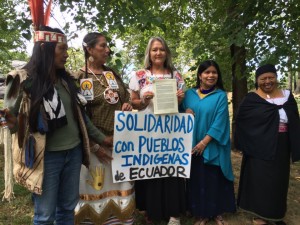 September 27, 2015 (New York City, NY) Today marked a historic milestone in the movement for environmental justice and indigenous rights. Indigenous women leaders of the North and South Americas signed a first ever treaty agreement declaring solidarity in the movement to protect Mother Earth from extractive industries.
September 27, 2015 (New York City, NY) Today marked a historic milestone in the movement for environmental justice and indigenous rights. Indigenous women leaders of the North and South Americas signed a first ever treaty agreement declaring solidarity in the movement to protect Mother Earth from extractive industries.
Casey Camp-Horinek (Ponca) and Pennie Opal Plan (Idle No More Bay Area), who serve as representatives on the Indigenous Environmental Network’s Delegation for the COP 21 United Nations Summit in Paris, met with Kichwa leaders, Patricia Gualinga and President of the Association of Sapara Women, Gloria Ushigua, who serve as representatives of the Amazon Watch Delegation.

Statement from Casey Camp-Horinek, of the Ponca Nation regarding the Indigenous Women of the North and South – Defend Mother Earth Treaty Compact 2015:
“We acknowledge this moment on Mother Earth for the 4th Red Moon of this year is eclipsing and offering us this chance to renew and defend the rights of Mother Earth as Indigenous Women. We gathered on this sacred day in ceremony to honor the ancestors who brought us to this point where we could stand strong in unified love of our Mother the Earth, our Father the Sky and the undying duty to protect the air, water, earth and all of our relatives for the future generations. We give thanks for the guidance and the support that made this day the sacred day that it has become at this historic Treaty between the Indigenous Women of the North and South. We invite and implore the prayers and the spreading of the word to rise up and join this movement that has begun in the times before us and moves into this wave of awareness across the face of our Mother.”
Indigenous Environmental Network Statement on Keystone XL Pipeline Victory
By Dallas Goldtooth
"This is a climate justice victory. The northern leg of the Keystone XL pipeline would not have been rejected this morning if it wasn't for the foundation that the environmental and climate justice movements have built over generations. And it would not have been rejected if it wasn't for those on the frontlines who fought back against the initial permitting process seven years, and continued their leadership in the mobilizations, organizing, events, press, etc to come.
A big wave of thanks to the First Nations resistance at the source, the tribes along the pipeline route, the landowners and farmers and ranchers who joined forces, the social justice organizing at all sides of this project, and the climate justice movement at large!"
Remember this: President Obama rejected this permit -- but it was ONLY because of grassroots mobilization this could have happened. I thank YOU all for this win, above and beyond any thanks to any President.
WE made this happen.
----------
I personally want to say thank you to Marty Cobenais- He was the IEN pipeline campaign organizer before me. He laid a solid foundation for community engagement and organizing that greatly contributed to the coalition building needed for this win! Thank you brother. Miigwech!
